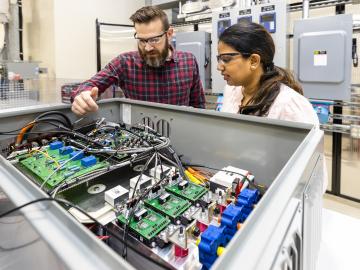
Filter News
Area of Research
- Biology and Environment (17)
- Computer Science (1)
- Electricity and Smart Grid (1)
- Energy Science (17)
- Fuel Cycle Science and Technology (1)
- Fusion and Fission (7)
- Fusion Energy (3)
- Isotopes (1)
- Materials (12)
- Materials Characterization (1)
- Materials Under Extremes (1)
- National Security (19)
- Neutron Science (6)
- Supercomputing (18)
News Topics
- (-) Clean Water (5)
- (-) Computer Science (23)
- (-) Fusion (9)
- (-) Grid (16)
- (-) Machine Learning (15)
- (-) Materials Science (16)
- (-) National Security (21)
- (-) Quantum Science (9)
- (-) Security (3)
- (-) Space Exploration (4)
- 3-D Printing/Advanced Manufacturing (20)
- Advanced Reactors (3)
- Artificial Intelligence (26)
- Big Data (10)
- Bioenergy (22)
- Biology (29)
- Biomedical (7)
- Biotechnology (6)
- Buildings (14)
- Chemical Sciences (24)
- Composites (6)
- Coronavirus (4)
- Critical Materials (6)
- Cybersecurity (9)
- Education (3)
- Emergency (1)
- Energy Storage (21)
- Environment (43)
- Exascale Computing (15)
- Fossil Energy (2)
- Frontier (19)
- High-Performance Computing (33)
- Hydropower (3)
- Irradiation (2)
- Isotopes (11)
- Materials (59)
- Mathematics (2)
- Mercury (2)
- Microelectronics (2)
- Microscopy (7)
- Molten Salt (1)
- Nanotechnology (7)
- Neutron Science (32)
- Nuclear Energy (21)
- Partnerships (24)
- Physics (14)
- Polymers (4)
- Quantum Computing (12)
- Simulation (29)
- Software (1)
- Summit (9)
- Transportation (18)
Media Contacts

When reading the novel Jurassic Park as a teenager, Jerry Parks found the passages about gene sequencing and supercomputers fascinating, but never imagined he might someday pursue such futuristic-sounding science.

A study led by researchers at ORNL could uncover new ways to produce more powerful, longer-lasting batteries and memory devices.

Computing pioneer Jack Dongarra has been elected to the National Academy of Sciences in recognition of his distinguished and continuing achievements in original research.

Inspired by one of the mysteries of human perception, an ORNL researcher invented a new way to hide sensitive electric grid information from cyberattack: within a constantly changing color palette.

A study led by Oak Ridge National Laboratory researchers identifies a new potential application in quantum computing that could be part of the next computational revolution.

Oak Ridge National Laboratory scientists exploring bioenergy plant genetics have made a surprising discovery: a protein domain that could lead to new COVID-19 treatments.

Using disinformation to create political instability and battlefield confusion dates back millennia. However, today’s disinformation actors use social media to amplify disinformation that users knowingly or, more often, unknowingly perpetuate. Such disinformation spreads quickly, threatening public health and safety. Indeed, the COVID-19 pandemic and recent global elections have given the world a front-row seat to this form of modern warfare.

When virtually unlimited energy from fusion becomes a reality on Earth, Phil Snyder and his team will have had a hand in making it happen.

Researchers at ORNL are helping modernize power management and enhance reliability in an increasingly complex electric grid.

How did we get from stardust to where we are today? That’s the question NASA scientist Andrew Needham has pondered his entire career.


